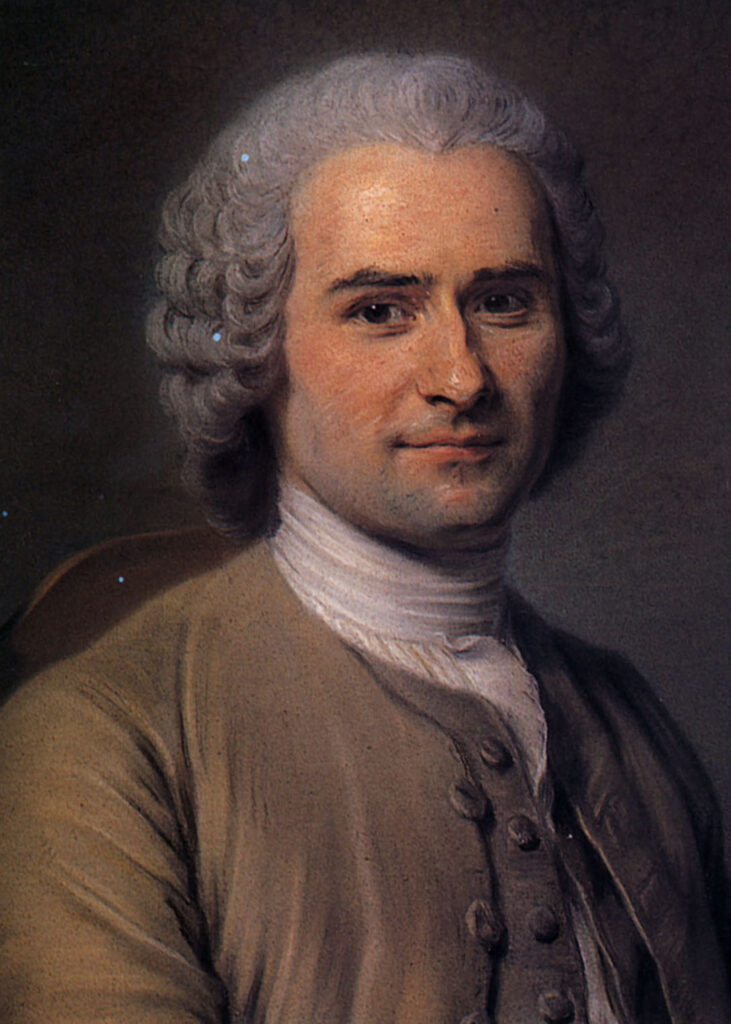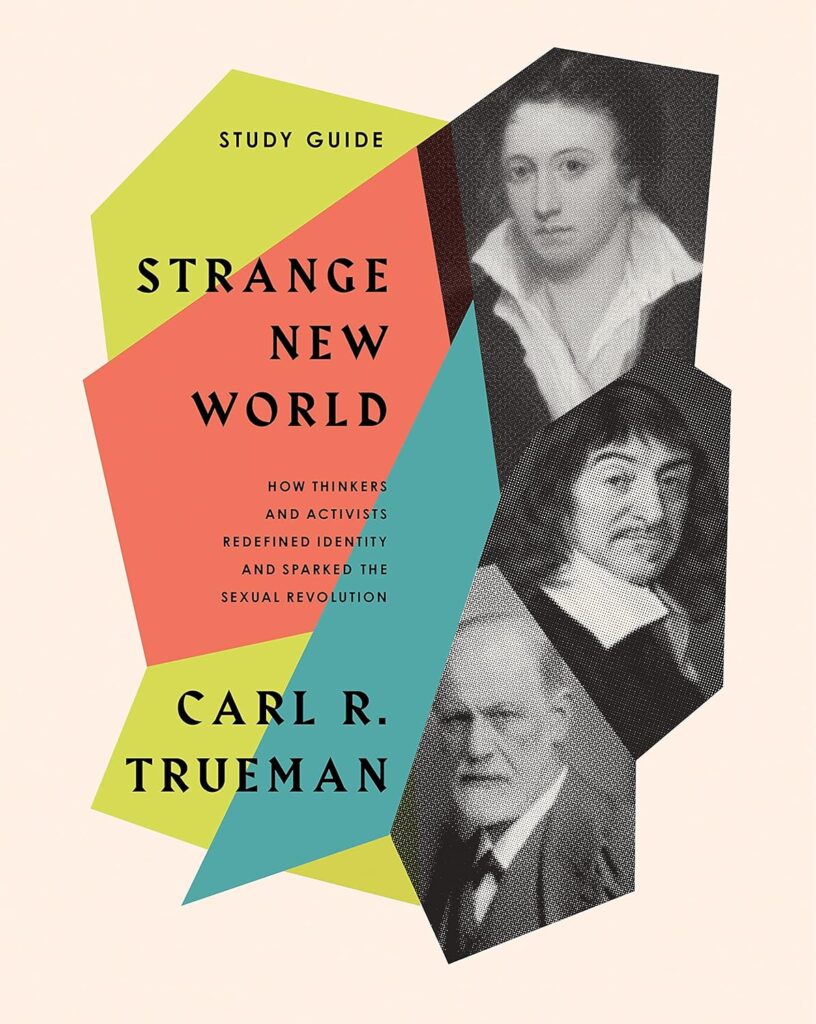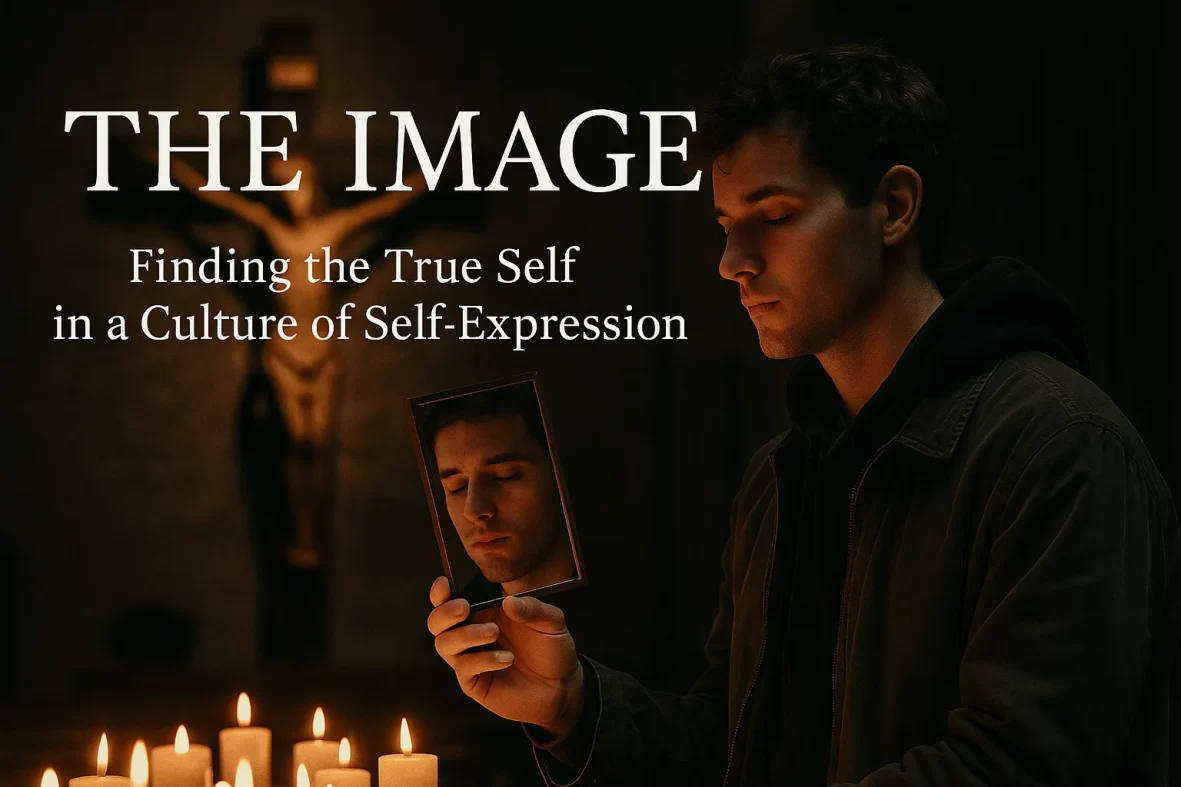Introduction: The Tale of Two Identities
Imagine a teenage girl, Emma, growing up hearing the constant refrain, “Follow your heart.” In school, on social media, even in animated movies, she’s told that her deepest feelings define her. One day she’s given an assignment to write her personal identity story. Emma feels excited at first—finally, a chance to “be true to herself.” But as she stares at the blank page, anxiety bubbles up. Who am I really? She wonders if her feelings are enough to build a life on, and why the freedom to “be yourself” often feels like a heavy burden. Meanwhile, at church on Sunday, she hears Jesus’ startling words: “If anyone wishes to come after Me, let him deny himself, and take up his cross daily and follow Me” (Luke 9:23, LSB). Emma’s story is the story of many Christians today, caught between the culture’s call to expressive selfhood and Christ’s call to find ourselves by losing ourselves.
In our modern society, a powerful story is being told about identity. It’s the story that you are whoever you feel you are inside, and that expressing those inner feelings to the world will unlock your true purpose. This idea has swept through Western culture, giving rise to phrases like “Live your truth,” “Follow your heart,” and “You do you.” It sounds empowering, even liberating. But is it? In this blog post, we will journey through the rise of this modern creed—what scholar Carl Trueman calls “expressive individualism” —and contrast it with the ancient path of biblical identity. Along the way, we’ll weave in vivid stories, biblical theology, and insights from Christian thinkers (Reformed, Baptist, and beyond) to shine light on the confusion and the hope in our strange new world.
What Is Expressive Individualism?
The “Religion” of Self-Expression
In simplest terms, expressive individualism is the belief that the meaning of life is found by looking inward, discovering one’s deepest desires, and expressing them outwardly. As Carl Trueman explains, it’s “the idea that each of us finds our meaning by giving expression to our own feelings and desires” . In this view, authenticity—being true to your inner self—is the highest virtue. Society, tradition, or religion should not suppress your personal truth. To express yourself is not just a right but almost a sacred duty.
- A Modern Creed: Sociologist Robert Bellah coined the term expressive individualism to describe this worldview that “demands that our inner feelings must be expressed if we are to become our true selves.” In other words, who you feel you are inside should determine who you actually are and how you live. Feelings become the foundation of identity. For example, if someone feels a strong internal sense that they are “meant to be” a certain way—whether that’s in career, relationships, or even gender—that feeling is considered the truest thing about them. Personal happiness is pursued through self-expression, and anything or anyone that interferes is seen as an obstacle or even an oppressor.
- “You Do You”: Everyday Examples: This philosophy isn’t confined to academia; it’s the air we breathe. Think of popular slogans and stories: the Disney movies where the hero discovers themselves by casting off others’ expectations, or the social media profiles curated to showcase “the real me.” When a friend says, “Do what makes you happy; follow your heart,” that’s expressive individualism talking. An illustration in Trueman’s work contrasts generations: his grandfather found satisfaction in a job well done to provide for family, whereas today “we define ourselves by the psychological well-being we find in expressing our needs and preferences.” Even our job satisfaction has shifted from duty to self-fulfillment. The intuition that “life is about me and my fulfillment” has become a guiding mindset.
- A “New Religion” of Self: Expressive individualism functions like a secular religion. It has a creed (“be yourself”), a moral code (authentic self-expression is good; repression of your inner self is bad), and even evangelists (influencers, entertainers, and sometimes educators encouraging youth to discover and flaunt their unique identity). It promises a form of salvation: if you fully embrace who you feel you are, you’ll be happy and free. There is a half-truth here—each person does have unique value—but this creed makes a critical error by assuming the self is inherently good and reliable. As we’ll see, the Bible gives a very different diagnosis of the human heart. But before we contrast it with Scripture, we must understand how this “Age of the Self” came to be.
From Rousseau to the Sexual Revolution:
How Did We Get Here?
Expressive individualism didn’t appear overnight; it’s the fruit of ideas that developed over centuries. Carl Trueman in The Rise and Triumph of the Modern Self unfolds a fascinating historical journey . Here’s a storytelling walkthrough of that journey, highlighting key thinkers and cultural moments (don’t worry, we’ll keep it lively and relevant):
1. The Romantic Roots – Turning Inward
Let’s travel back to the eighteenth century and meet a man in Paris writing his life story. Jean-Jacques Rousseau begins his autobiography by boldly asserting,

“I am commencing an undertaking, hitherto without example, and which will never find an imitator”
—his goal is to paint his inner self truly, believing that being in touch with one’s inner nature is the path to virtue and happiness. Rousseau (1712–1778) helped flip the script on identity: previously, people assumed we discover truth and self by looking outward (to God, family, tradition, community). Rousseau argued that society corrupts the individual; our truest self is found in the purity of our own feelings apart from social expectations. He and other Romantic era thinkers (like the poets Wordsworth and Shelley later on) celebrated the individual’s emotions and imagination.
Inner voice became king.
“I Feel, Therefore I Am”: Around the same time, philosophers like René Descartes (1596–1650) had already turned attention inward with

“I think, therefore I am.”
The Romantics took it further: “I feel, therefore I am.” This laid a foundation for expressive individualism: truth and identity start with me. Trueman notes that these early thinkers granted “final authority to inner feelings” and assumed these feelings are pure guides to who we are. In their view, authenticity means breaking free from external expectations—be it the church, social norms, or even biological realities—to follow the voice within.
A Social Imaginary Shift: Philosopher Charles Taylor calls this change a shift in the “social imaginary”, meaning the intuitive way people in a society imagine how life should be . Two hundred years ago, the average person’s self-image was tied to their role in family, church, or nation. Today, thanks in part to Romantic ideas, we intuitively see ourselves as autonomous individuals who must invent or discover our unique identity.
It’s like the difference between seeing life as a painting (where each person is a brushstroke contributing to a bigger picture) versus a selfie (where my face and feelings are the focus). The Romantic era tilted us toward the selfie view of life.
2. The Psychologized Self – From Feelings to Freud
Fast forward to the late 19th and early 20th centuries. Enter Sigmund Freud (1856–1939), the father of psychoanalysis. Freud builds on the inward focus but adds a provocative element: sex. He effectively said: to understand who we are, we must understand our sexual desires and subconscious drives. In Freud’s theory, even early childhood is dominated by sexual and sensual drives (he proposed famously controversial stages like oral, anal, phallic development in children) .
- Sexuality as Identity: Before Freud, sex was something one did (an activity, governed by moral norms or for procreation). After Freud, sex became something one is . Trueman summarizes Freud’s watershed contribution: “before Freud, sex was an activity; after Freud, sex is definitive of who we are as individuals.” Our very identity came to be seen through a sexual lens. Terms like heterosexual, homosexual (and much later, a whole range of gender identities) flow from this legacy of seeing sexual desire as core to self. If inner feelings are the source of truth (per the Romantics), and if sexual feelings run particularly deep, then it follows (in a secular mindset) that expressing one’s sexual desires is key to being authentic.
- The Therapeutic Era: Freud also cast traditional morality (especially religious sexual ethics) as repressive forces causing psychological distress. He viewed religion and societal rules as imposing guilt and inhibitions that keep us from being “true to ourselves” . Though Freud himself was more pessimistic (he thought unchecked desires would lead to chaos), his ideas were taken by others to argue that casting off sexual restraint was necessary for personal wholeness. Thus, the self became psychologized, and psychology became sexualized . The concept of “inner happiness” took center stage—our mental and sexual well-being became paramount. Society at large started adopting a therapeuticoutlook: feelings of personal fulfillment (or lack thereof) became the measure of right and wrong.
Picture our friend Emma’s great-grandfather in 1925 and Emma today in 2025. Great-Grandpa might say, “I am a teacher, a husband, a father,” describing his identity in terms of his relationships and duties. Emma, reflecting our psychologized age, might say, “I am an introvert, a creative spirit, and I feel most myself when I’m painting or when I’m recognized for who I am.” Identity has shifted from external roles to internal feelings.
3. The Sexual Revolution – Freedom and Transgression
Now we jump to the tumultuous mid-20th century: the 1960s and 1970s. The Sexual Revolution is in full swing—fueled by the birth control pill, changing social norms, and a spirit of rebellion against authority. But underpinning this revolution were the intellectual matches struck earlier. Thinkers like Wilhelm Reich (1897–1957) and the cultural movement of the 1960s took Freud’s ideas and lit them on fire. They argued that for society to be truly free, it must liberate sexuality completely.
- Marx, Nietzsche, and Marcuse – Revolt against the “Old Morality”: Trueman points out that philosophers Karl Marx and Friedrich Nietzsche paved the way by treating moral truths as subjective human constructs . Marx saw traditional religion and morality as tools the powerful used to oppress the masses; Nietzsche declared “God is dead” and with him the death of any binding morality. Their message? To be free, we must overthrow the old moral order. Herbert Marcuse (1898–1979) of the Frankfurt School then blended Marx and Freud, arguing that sexual codes were instruments of oppression and had to be shattered for political liberation . In Marcuse’s view, “the subversion and dismantling of dominant norms surrounding sexuality” was necessary for justice .
- “Transgress to Progress”: By the late 20th century, transgressing traditional sexual norms wasn’t just a personal choice; it was seen as an act of political liberation and self-actualization . People truly believed (and many still do) that casting off biblical sexual ethics leads to a more authentic and free humanity. The Sexual Revolution normalized behaviors once widely considered immoral, under the banner of “be true to yourself and don’t let anyone tell you whom or how to love.” This is how we arrived at mainstream acceptance of things like no-fault divorce, cohabitation, widespread pornography, and later, the rapid affirmation of homosexual and transgender identities. Expressive individualism was the engine powering all this change: if the highest good is expressing your inner self, then any traditional moral standard that restricts sexual expression must be repressive and discarded.
Recall Trueman’s provocative opening question:
“How did the statement ‘I am a woman trapped in a man’s body’ come to make sense?”
A century ago, that line would have baffled people. Today, a not insignificant portion of society treats it as deeply meaningful and true. The journey from bafflement to celebration of such a statement is the journey we just traced:
inward authority (Romantics) +
identity-as-sexual (Freud) +
throw off norms (Revolution) =
My inner feeling of gender/sexual identity is my reality, and I must live it out loud.
This is the logic that expressive individualism has woven into our cultural fabric.
A “Strange New World”:
The Culture Expressive Individualism Made

We wake up today in what Carl Trueman calls a “strange new world.” The changes in views of self and identity feel drastic and sudden—like a revolution that happened while we weren’t looking . Let’s step back and observe some features of our current cultural moment, especially as they concern truth, authority, sexuality, and the confusion many feel.
- The Reign of Feelings: In public discourse now, personal experience often trumps objective facts. “My truth” has become a popular phrase. If someone feels something strongly, questioning it can be seen as an attack on them. For example, if a biological male feels he is female, in our culture it’s deemed offensive or “oppressive” to disagree with that feeling. Why? Because expressive individualism has taught us that the self (as internally defined) is sovereign. Trueman notes that identity politics today – whether racial, sexual, ethnic – often sees any challenge to someone’s self-asserted identity as a power play by oppressors . In this strange new world, feelings are sacred, and “the dominant Western narrative of truth is [seen as] an ideological construct designed to preserve the power structure” . In other words, longstanding truths or authorities (like Scripture or even biology) are cynically viewed as mere tools of oppression, easily cast aside in the name of personal freedom.
- The Sexual Revolution’s Aftermath: We live amid the full bloom of the sexual revolution’s principles. Sexual ethics are now deeply entwined with personal identity. Terms like LGBTQ+ didn’t exist a few decades ago; now they are common. Society not only permits but celebrates expressing any and all sexual desires as “being true to yourself. ”Marriage has been redefined, casual hookups are normalized, and gender is considered by many as a fluid spectrum defined by internal sense.
- Expressive individualism connects to the sexual revolution like a root to a flower: it supplies the logic that makes radical changes in sexual norms seem not only acceptable but morally necessary. For instance, within a mere couple of decades, Western culture went from widely rejecting same-sex marriage to considering it a moral good and even a human right. Underneath that swift change was the growing belief that suppressing someone’s sexual or gender self-expression is a grave wrong, while affirming it is a great good.
- Confusion and Contradiction: Yet, this new world is not paradise. Alongside celebration of “freedom,” there is profound confusion about truth and authority. If everyone has their own truth, who can say what’s real? We see debates raging: What is a man or a woman? What is marriage? What is the value of human life (when even the definition of personhood can be subjectively altered)? In the chaos, ironically, new forms of tyranny arise—social pressures to conform to the latest version of “personal truth.” A book questioning the transgender movement gets banned while Mein Kampf is still sold ; a woman is celebrated for living as a man but criticized if she chooses to be a homemaker. The standards seem ever-shifting. “Who’s to say what’s right and wrong?” becomes a real, troubling question. The result is a generation (especially of young people like Emma) experiencing high levels of anxiety, depression, and a desperate search for stable identity in a sea of relativism.
- The Idol of Self and Its Cracks: From a Christian lens, we can interpret this “brave new world” as humanity doing what it has done since the Garden of Eden: “You will be like God,” the serpent promised (Genesis 3:5). In expressive individualism, the self plays god – determining good and evil based on personal desires. It’s essentially an idolization of the self. But idols cannot deliver what they promise. Many who chase self-made identities find themselves emptier. As one writer put it, “weird, ambiguous ways of navigating to truth don’t help. [It] creates more confusion than clarity” . We end up with what C.S. Lewis called “men without chests” – people taught to reject objective truth and duty, and then left without the virtue and stability needed for life . The pressure to self-create is immense; being your own god is exhausting. No wonder Emma feels that burden. The gospel of self-expression is ultimately a false gospel – one that cannot save or satisfy.
Yet, in all this, there’s an opportunity: the bankruptcy of the modern self can make souls more hungry for a better story. This is where the biblical worldview shines as a beacon of hope and sense.
The Cross and the Self: Biblical Identity in Contrast
Against the backdrop of expressive individualism, the Bible tells a radically different story of identity. It’s a story where we are not self-made, but God-made; not self-defining, but God-defined. And paradoxically, it’s in losing ourselves that we truly find ourselves. In this section, we’ll unpack key biblical truths that form the foundation of a Christian’s identity, using Scriptures (from the Legacy Standard Bible) that speak directly to the contrast between “express yourself” and “deny yourself.” Think of it as the antidote to the false gospel of self.
1. Our Hearts Are Fallen, Not Infallible
The Deceitful Heart vs. God’s Truth
Expressive individualism says, “Trust your heart. Your heart will lead you to truth.” Scripture says, “The heart is more deceitful than all else and is desperately sick; who can understand it?” (Jeremiah 17:9, LSB). Ouch. That’s a jarring wake-up call. Far from teaching that our feelings are always pure and trustworthy, the Bible diagnoses a sinful heart that often lies to us . Jesus taught that “out of the heart come evil thoughts, murders, adulteries, fornications…” (Mark 7:21-22) – in other words, not every desire we find within is good.
- Danger of Self-Deception: From the Garden of Eden onward, humans have believed the lie that we know better than God. Adam and Eve chose to trust their desire for the forbidden fruit over God’s command, effectively saying “my desire defines my good.” Today’s culture repeats this pattern when it says if you feel a strong desire (whether for forbidden sexual behavior, greed, pride, etc.), you should indulge it as part of your identity. But biblically, sin has warped our desires. As Reformers like John Calvin noted, the human heart is an “idol factory,” constantly producing false gods (like self, pleasure, power) to adore in place of the true God. So a key biblical principle is mistrust your inner compass if it leads you contrary to God’s revealed will. “There is a way which seems right to a man, but its end is the way of death” (Proverbs 14:12, LSB).
2. Created for God’s Glory, Not Our Own
Imago Dei vs. Self-Made Identity
- God’s Word: An External Compass: If our internal compass is broken, we need an external one. Praise God—He has given us exactly that! Scripture, and supremely Jesus Christ, serve as the reliable guides for who we are and how we should live. “God, after He spoke long ago to the fathers in the prophets in many portions and in many ways, in these last days spoke to us in His Son” (Hebrews 1:1–2, LSB). We are not left groping in the dark of subjective feelings; God has spoken. His Word is a lamp to our feet (Psalm 119:105). So when culture asks, “Who’s to say what’s right and wrong?”, the Christian answers: God has said (Heb. 1:1–2). Our Creator knows us better than we know ourselves. Thus, biblical authority lovingly trumps personal autonomy. It corrects our wayward hearts and points us to truth outside of ourselves.
Reformed theology, with its emphasis on human depravity and God’s sovereignty, strongly supports this. The reformer Martin Luther once said that humanity is “curved in on itself” (incurvatus in se) – a vivid image of our sinful nature bending everything toward self-interest. The gospel straightens us upward toward God and outward toward others. Rather than trusting a curved heart, we trust God’s straight truth. John MacArthur bluntly observed our era “lives in a culture of self-love… a generation of self-lovers”, whereas Jesus’ call to deny self “is fundamentally opposite how people think in our culture.” The Bible unmasks self-love as a pathology (2 Timothy 3:2 calls lovers of self one of the marks of godlessness) and prescribes self-denial in its place.
One of the most liberating truths of Scripture is that we are not self-created beings; we are creations of God. Genesis 1:27 declares, “God created man in His own image, in the image of God He created him; male and female He created them.” This means our identity is received, not achieved. From the start, God bestowed on us a status and purpose: we are His image-bearers, designed to reflect His character and steward His world. As theologian Michael Heiser puts it, “We are created to image God, to be his imagers… The image is not an ability we have, but a status. We are God’s representatives on earth. To be human is to image God.” . How radically different is that from the modern idea that we must invent ourselves!
- Dignity and Design: Imago Dei (Latin for “image of God”) is a cornerstone of Christian anthropology. It grants every human inherent dignity and worth—value given by God, not earned by self-expression. It also implies a design: just as a mirror is made to reflect, humans are made to mirror God’s righteousness, creativity, love, and holiness (albeit imperfectly in our fallen state). Expressive individualism often rejects the notion of any given design in favor of self-determined purpose. But the clay does not tell the potter why it was made (Isaiah 45:9). We find true fulfillment when we live according to our Creator’s design.
- Male and Female – God’s Gifted Identities: Notably, Genesis ties the image of God to being male and female. Our bodies, our created sex, are part of God’s good design and gift. Modern self-identity debates (like transgenderism) sometimes treat the body as irrelevant or in need of alteration to match the inner feeling. Scripture, however, affirms the body and God’s assignment of our identity through it. We are not souls trapped in irrelevant bodies; we are holistic beings. As such, Christians view our maleness or femaleness, and the boundaries God set for sexuality (faithful marriage between a man and woman), as part of His loving identity-gift to us. It’s not ours to redefine, but to receive with thanksgiving.
- We Exist to Reflect His Glory: The Westminster Catechism famously states, “Man’s chief end is to glorify God and enjoy Him forever.” In stark contrast, expressive individualism implies man’s chief end is to glorify himself and enjoy himself forever. The purpose of life according to Scripture is God-centered, not self-centered. A blogger critiquing expressive individualism summarized it well: “Life is about Christ and His glory. We exist to make Him look good, not the other way around.” . When we grasp that we are imagers, made to image God, it frees us from the tyranny of obsessing over our own image. Our worth is secure as God’s creation; our mission is to shine His light. Ironically, in forgetting ourselves and focusing on God, we become our most authentic selves—exactly as our Maker intended.
3. Deny Yourself to Find Yourself:
The Call of Christ vs. The Cult of Self
Jesus Christ issues a call that cuts against every instinct of expressive individualism. He said to his disciples, “If anyone wishes to come after Me, let him deny himself, and take up his cross daily and follow Me” (Luke 9:23, LSB). To the modern ear, “deny yourself” sounds harsh—almost heretical in a culture of self-affirmation. Yet, in that seeming harshness lies a path to true life. Jesus immediately adds, “For whoever wishes to save his life will lose it, but whoever loses his life for My sake, he is the one who will save it” (Luke 9:24, LSB). This is the grand paradox of the gospel: we find our true self only by relinquishing our autonomous self. We must empty our hands of the trinkets of self-will to receive the treasure of Christ’s life in us.
- The False Gospel of Self vs. The True Gospel: Expressive individualism preaches “believe in yourself, follow your heart, live for your glory.” Jesus preaches “deny yourself, follow Me, live for God’s glory.” These are diametrically opposed . As one writer said, “Expressive individualism sees personal expression as the highest form of reality. The Christian life, however, is not about expressing yourself, but dying to yourself… You might say that we get life by dying.” . The culture’s path leads to a dead end—quite literally spiritual death—because it idolizes self (and the self cannot save itself). Christ’s path, which passes through the cross, leads to resurrection life. He is not asking us to become nothing; He’s inviting us to lay down our fake IDs so He can hand us our true identity as children of God.
- “Take Up Your Cross”: In first-century context, taking up a cross meant preparing to die. It’s a total surrender of one’s claim to self-direction. Jesus uses this startling image to communicate that following Him is not a hobby or a supplement to our agenda—it replaces our agenda. We stop saying, “my will be done” and start praying, “Thy will be done.” Each day, the Christian intentionally sets aside the throne of self and bows to Christ as Lord. This sounds extreme, but consider: if Christ is truly God Incarnate who made us and loves us, then yielding to Him is the wisest thing we can do. He knows best; we do not.
- Finding the Real You (Lewis’s Analogy): C.S. Lewis, with his gift for imagery, described this paradox brilliantly:
Give up yourself, and you will find your real self. Lose your life and you will save it… Look for yourself, and you will find in the long run only hatred, loneliness, despair, rage, ruin, and decay. But look for Christ, and you will find Him, and with Him everything else thrown in.
Think of a seed—if it stays a seed, it rots; if it “dies” by being buried, it springs up to new life (John 12:24). So it is with us. Those who clutch their self-willed life tight will see it turn to dust. Those who surrender their life to Jesus find the abundant life they were made for (John 10:10). Self-denial is the surprising key to self-fulfillment in God.
As Pastor John MacArthur notes,
…this is a far cry from [the world’s] expressive individualism. Life is about Christ and His glory… And in turn, paradoxically, we gain life.”
Picture two people at the edge of a cliff above a deep pool of water. One clings to the railing, afraid to jump—this is the person clinging to self. Another trusts and leaps into the water, emerging refreshed—this is the one who lets go in faith. Jesus essentially says, Jump into My arms; lose yourself in Me. It feels like a death of control, but it results in the discovery of who you really are in God’s design. Many of us can testify that when we finally stopped trying to write our own identity and instead accepted the identity God gives (redeemed, beloved, servant of God, co-heir with Christ!), we found far more peace and joy than we ever did chasing self-made dreams.
4. “You Are Not Your Own”
Belonging to Christ vs. Self-Ownership
Expressive individualism exalts personal autonomy: I belong to myself. The Christian gospel tells us the opposite: if you are in Christ, you belong to Him. The Apostle Paul writes, “You are not your own, for you were bought with a price. Therefore glorify God in your body” (1 Corinthians 6:19-20, LSB). Here’s a sweeping truth of biblical (especially Reformed and Baptist) theology: Jesus is Lord over every aspect of our lives, and we find freedom in being His bondservants. In fact, John MacArthur’s book Slave: The Hidden Truth About Your Identity in Christ points out that the New Testament most often calls believers “slaves” (doulos) of Christ – a concept often softened in translation, but one that early Christians wore as a badge of honor. To be Christ’s slave is not demeaning, it’s liberating, because His “yoke is easy” and “burden is light” (Matthew 11:30).
- A New Master: When Jesus redeems us, He breaks the chains of sin and self that once bound us. But we are not set free to drift aimlessly; we gladly come under the loving lordship of Christ. Everyone serves something – either self (and sin) or God. The cry of our culture “I am my own” sounds like freedom but often leads to enslavement to passions and public opinion. The cry of the Christian “I belong to Jesus” sounds like surrender but leads to true freedom and rest for our souls. As one early Christian catechism put it, “I am not my own, but belong unto my faithful Savior Jesus Christ.”
- The Word as Final Authority: Because we belong to Christ, we submit our understanding of truth to His Word. Rather than picking and choosing beliefs based on what resonates with our feelings (which is expressive individualism’s approach even to religion), a follower of Jesus yields to Scripture’s authority. If the Bible’s teaching on sex, or honesty, or forgiveness clashes with our personal feelings, it is our feelings that must give way, not Scripture. Hebrews 1:1-2 (cited above) reminds us God has spoken through His Son; Jesus Himself said, “Scripture cannot be broken” (John 10:35) and prayed, “Sanctify them in the truth; Your word is truth” (John 17:17). This conviction in the sufficiency and authority of Scripture is a hallmark of Reformed theology (sola Scriptura). It guards us against the subtle ways expressive individualism can creep into the church—like when we treat the Bible as a buffet of teachings to affirm or ignore based on personal preference. Instead, we approach God’s Word saying, “Define me, teach me, correct me.” This is the posture of a true disciple.
- Identity in Community: One more contrast worth noting: Biblical identity is not only individual but corporate. The New Testament favorite way to describe Christians is as those “in Christ” – which implies union with Him and with His body (the community of believers). We are “a people for God’s own possession” (1 Peter 2:9), “members of one another”(Romans 12:5). Expressive individualism tends to isolate – each person on a solo quest for self-definition. But in Christ, we are given a family, a church, where our identity is also shaped in fellowship, love, accountability, and service. This counters the loneliness that often accompanies radical individualism. We are sheep in a flock, not lone rangers; we find meaningful identity as part of the story God is weaving among His people, not by writing a story in which we’re the solo hero.
Engaging the Culture:
Speaking Truth in Love in an Age of Self
Having explored the stark differences between the cultural gospel of self-expression and the biblical gospel of Christ, how do we as Christians navigate and minister in this environment? It’s easy to become either angry culture-warriors or silent bystanders, but the gospel calls us to a third way: compassionate conviction. Here are some suggested points of engagement, with theological and cultural commentary, to help us live out truth and love:
- Be Informed and Discerning: Carl Trueman wrote these books (Rise and Triumph of the Modern Self and Strange New World) precisely to help Christians understand why the world thinks the way it does . We should not be naive. Like the sons of Issachar in the Old Testament, we need to understand the times (1 Chronicles 12:32) so we know how to respond. This means educating ourselves (as you’re doing now) about concepts like expressive individualism, critical theory, and the sexual revolution’s ideology . When you hear statements in media or from friends, try to trace them: “Ah, that song lyric – ‘what my heart wants is what it wants’ – that reflects the ‘follow your heart’ creed I know isn’t biblical.”Develop a filter that measures cultural messages against biblical truth. Discernment is key in not letting false ideas take us captive (Colossians 2:8).
- Hold Fast to Scripture: In an age where everything seems up for debate, anchor yourself in God’s unchanging Word. Make a regular habit of reading Scripture, and teach your children or young believers to do the same. When new identity fads or moral claims arise, go first to “What do the Scriptures say?” (Romans 4:3). As the Already Not Yet blog noted, “The Bible is the Christian’s compass for morality… if one of our desires doesn’t align with God’s will, we shouldn’t act on it regardless of how bad we want to.” . We must both know and trust that God’s Word is good and sufficient. This conviction will give you calm confidence even when labeled old-fashioned or intolerant. Remember, the Word that created the universe has authority over cultural tides.
- Cultivate Humble Self-Examination: Because expressive individualism affects all of us (it’s part of our social imaginary ), Christians should continually check our own hearts. In what ways have we perhaps mixed this mindset with our faith? For instance, do we approach church as consumers (“what inspires me”)? Do we selectively obey God based on feelings? Do we value personal happiness over holiness? We must let the Holy Spirit and Scripture realign us to a God-centered posture daily. In other words, practice what we preach about self-denial and submission to Christ, so that our lives match our message. This authenticity will be a powerful witness; nothing undermines our message more than falling into the same self-focused ethos we critique.
- Share a Better Story: When engaging friends or the broader culture, it’s not enough to say “you’re wrong.” We have to paint the better story of the gospel. Everyone desires meaning, belonging, and identity. Show how Christianity meets those desires in a far deeper way than expressive individualism ever could. For example, if someone is enamored with “living their truth,” share how Jesus is the Truth (John 14:6) – solid, unchanging, freeing – and how knowing Him sets us free (John 8:32) from the exhausting task of self-invention. If someone thinks Christians are repressed or joyless because we don’t indulge every desire, share testimonies (perhaps your own) of the joy and peace that come from living according to God’s design, even when it meant saying “no” to some impulses. We can highlight stories of people who pursued the world’s way and found it empty, but then found hope in Christ. (Think of the many modern testimonies of those who left behind LGBTQ lifestyles or drug addictions, etc., not because they were “forced to,” but because they met Jesus and discovered a superior joy and identity in Him.)
- Love the Person, Challenge the Idea: In debates about sexuality or identity, Christians must remember we’re speaking to fellow image-bearers who are often deeply hurting or lost, just as we all were before grace. Compassion is key. Jesus was full of grace and truth (John 1:14). We should strive to listen to people’s stories empathetically. Often, behind someone’s staunch identity claims is a wound or longing. Affirm their value as a person even as you gently question the worldview they’ve absorbed. For example, with someone who says, “I just have to be true to myself,” you might respond, “I can understand the desire to live authentically. May I share with you why I’ve come to believe that my own heart can mislead me, and how I found a reliable source of identity outside myself?” Such a conversation pairs respect for them with a challenge to consider God’s perspective.
- Be a Counter-Cultural Community: The church should be a bright alternative to expressive individualism. That means being a community where love, sacrifice, and truth-telling flourish. In a world of ephemeral relationships (because everyone’s just doing their own thing), the church can display committed love – where we stick with each other as family in Christ, and encourage one another to follow God’s will. It also means we honor God’s created order in our life together: upholding the sanctity of marriage, celebrating the beauty of manhood and womanhood as God created, honoring singleness that is devoted to God, and so on. Our communities should be places where identities are not achieved by conforming to worldly trends, but received by grace. When people come into contact with a healthy Christian community, they should sense the aroma of something different – humility instead of pride, service instead of self-assertion, stable truth instead of shifting opinions. This itself is a powerful apologetic. As Jesus said, “By this all people will know that you are My disciples: if you have love for one another” (John 13:35).
- Proclaim Christ Above All: Finally, in all our engaging, we must keep pointing to Jesus Christ as the answer. The goal is not to win arguments about culture but to win people to Christ. He is the one who can change hearts. Preach the gospel in season and out (2 Timothy 4:2). The gospel message directly addresses identity: Through Jesus’ death and resurrection, we can be forgiven of our sinful self-worship and be born again into a new identity as a child of God (John 1:12-13, 3:3). In Christ, we are given a new heart (Ezekiel 36:26) and a new self “created after the likeness of God in true righteousness and holiness” (Ephesians 4:24). All the deepest needs that expressive individualism tries and fails to meet (to be known, to be loved, to have purpose) are ultimately met in a saving relationship with our Creator through Jesus. That’s incredibly good news worth sharing.
Conclusion:
The True Triumph of the Self—In Christ
As we conclude this outline, let’s return to Emma’s story—and yours and mine. We live in a time when the modern self has “triumphantly” seated itself on the throne of culture, yet many are discovering that throne to be shaky. The sexual revolution promised utopia and delivered broken hearts and confusion. The mantra “be true to yourself” left people like Emma anxious, constantly trying to discover or invent a self that is worthy. But the Christian gospel offers a refreshing, coherent, and hopeful resolution: You don’t have to be the center of the universe. In fact, you never could carry that weight. There is a God, and you are not Him—and that’s good news! Your identity is a gift to receive, not an endless project to achieve.
Carl Trueman observed that even Christians are subtly shaped by the culture of expressive individualism . We need, therefore, to continually recalibrate by the Bible’s story. From that story, here are final vivid contrasts to take to heart:
- The world says, “Expressive self is the key to life.” Jesus says, “Take up your cross and follow Me” (Luke 9:23).
- The world says, “Your feelings are reality.” Scripture says, “Your (God’s) Word is truth” (John 17:17).
- The world says, “Follow your heart.” Jesus says, “Follow Me” (Matt. 4:19).
- The world says, “Live your truth.” Jesus says, “I am the way, the truth, and the life” (John 14:6).
- The world says, “You belong to yourself.” Scripture says, “You are not your own…you were bought with a price”(1 Cor. 6:19-20).
In the end, expressive individualism is a lonely road; it asks each person to be their own creator, lawgiver, and savior. Christianity is a well-trodden path with a loving Shepherd leading the way. It frees us from the tyranny of self and ushers us into the joy of knowing the One who made us. To a culture adrift in the sea of self, we can confidently say that Christ is a solid rock on which to stand. He is the true source of identity, meaning, and salvation – the One in whom the “self” finally finds its home.
Let’s encourage one another and lovingly invite our confused world to step off the throne of self and bow before the throne of God. It’s there, at the foot of the cross, that we discover the liberating truth: we were never meant to glorify ourselves, but to glorify God and enjoy Him forever. And in so doing, we become our true selves – the masterpiece He intended us to be . This is the triumph of the redeemed self: not the rise of my self, but the rise of Christ in me, the hope of glory (Colossians 1:27).
Let’s live and share that better story with confidence and compassion in the midst of our strange new world. It’s a story with an ultimately happy ending – not “self” triumphant, but Jesus triumphant, and us triumphant in Him.
References
Heiser, M. S. (2015). The Unseen Realm: Recovering the supernatural worldview of the Bible. Lexham Press.
Lewis, C. S. (2001). Mere Christianity. HarperOne. (Original work published 1952)
MacArthur, J. F. (2008). Slave: The hidden truth about your identity in Christ. Thomas Nelson.
Trueman, C. R. (2020). The rise and triumph of the modern self: Cultural amnesia, expressive individualism, and the road to sexual revolution. Crossway.
Trueman, C. R. (2022). Strange new world: How thinkers and activists redefined identity and sparked the sexual revolution. Crossway.








